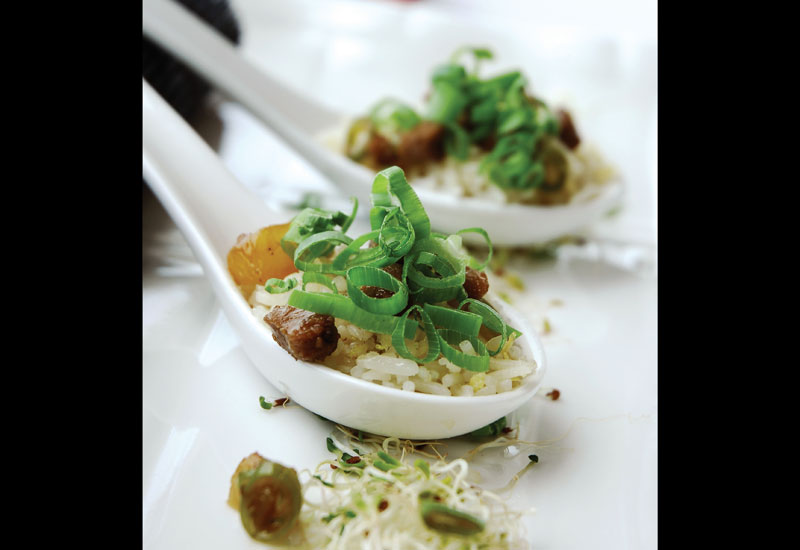Has the changing economic climate forced changes in your marketing strategy?
Van Jaarsveld: We’ve always marketed our business internally. Our strategy has been to let our products, our people and our service do the talking, and rely on word-of-mouth, which for us is still the key. That’s why we focus on training and developing to ensure the staff make the customer’s experience memorable. You can’t buy the kind of marketing that gives you.
Penhaligan: But staffing is becoming something of an issue; we have got a lot of hotels coming up in this area that are looking to recruit decent staff with hospitality training, and if you have staff who have been with you for a couple of years and there’s no position available to give them a promotion, or no money to give salary increases, they do start looking around.
And over-promotion is still happening, which is ridiculous — like a commis moving to become chef de partie. If you promote someone and they jump way up the ladder, you’ve got to wonder how much they’ve actually learnt — and how much they’ve missed out on.
Fakih: That’s something we’ve seen as well. We have around 1% per month of people jumping ship for promises of a higher title or more money — sometimes double their salary, which of course we cannot compete with.
Van Jaarsveld: I think we’ve been quite successful with our policy of promoting from within, which certainly makes people feel it’s worthwhile staying with the company. When staff see colleagues climb the ladder, it inspires others to persevere. So our focus on our people has really paid off, and honestly we’ve got hardly any staff turnaround — in the single figures, internationally.
Harb: We do the same. In Zaatar w Zeit, we have around 26 managers who were all promoted from within. We don’t have a single manager from outside. It reduces turnover, it increases staff commitment to the brand, and it’s really a very important thing to do.

Advertisement
Is there anything you anticipate will be a major challenge for outlets over the coming months?
Fakih: We believe the biggest challenge this year will be the cost of rent, which is really too high for the current sitaution in the market.
Unfortunately we are locked into long-term agreements. We are renegotiating our expired agreements, but many of the major ones — such as those at Dubai Mall — we are locked into for a longer period.
De Villiers: I think even though residential and some commercial office space rents have come down, from a retail, shopping centre or mall perspective, it won’t change.
Van Jaarsveld: But it does depend on the situation; if you have a site that you’ve been in for a number of years successfully, and the time comes to renegotiate the lease ahead, if you’re doing well, they’re going to make sure you pay for that. You’re not about to give up a great site, and they know that.
Penhaligan: I think there are some locations where an independent outlet does well, and the hotel group or development owner or whoever might consider shifting the brand out and put in one of their own concepts.
But it’s important to understand that there is a power in brands, and for developments to recognise just how much business these names bring in, as well.
Fakih: Of course the other issue at the moment is the service charge ban. We cut it off the menu, but unfortunately we will not be able to waive it — we will have to put it somewhere and work it into the menu, because these prices were set based on the labour cost, rents, operations and so on.
A percentage of this 10% went to the staff; then the rest went towards supplementing price changes, for example of purchased foodstuffs.
Penhaligan: We went and had meetings with Dubai Municipality to clarify this, and the law says if you are a restaurant that pays the 10% Municipality fee, then you are entitled to add the 10% charge onto your bill. So basically that’s any hotel or free-standing restaurant where you have alcohol; those are the ones paying a Municipality fee.
Even for us, this has had an impact though; our Wagamama outlet at The Greens is not licensed, so there we cannot add a service charge.
Harb: It basically takes 10% directly from your bottom line. The only plus for us is that in Zaatar w Zeit, Cinnabon and Seattle’s Best Coffee, we didn’t have that service charge in place anyway. But Roadster Diner had it, so we had to cut that and now we’re looking for other ways to recoup the 10%.
We think though if we increase our prices, we have to add value, and we have a plan for that — a new menu, a wider selection of dishes and so on.









 Search our database of more than 2,700 industry companies
Search our database of more than 2,700 industry companies









